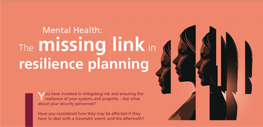Mental Health/ Resilience Planning

By Patrick Rea: ASIS Member and security marketing specialist and Director of PTSD Resolution, the charity for the mental health of UK Forces’ Veterans www.ptsdresolution.org.
Mental Health: the Missing Link in Resilience Planning
You have invested in mitigating risk and ensuring the resilience of your systems and property - but what about your security personnel? Have you considered how they may be affected if they have to deal with a traumatic event, and the aftermath?
There is much talk in the security industry about the issue of mental health, but many organisations still struggle to understand what they need to do to protect staff from the effects of trauma and how to align their training programmes, HR and management.
This matters. Responsible employers support both the physical and mental welfare of their teams. All organisations have a duty of care to staff in relation to work-related incidents. There is a direct impact too in the risk of higher rates of absenteeism and costly errors in the workplace.
Your staff may be well trained in agreed security procedures and rehearsed in dealing with a range of scenarios involving potentially dangerous situations - but coping with the psychological impact is another issue entirely.
The problem is that it is impossible to predict how anyone, even ourselves, will react to a disturbing event. We are all affected differently.
An individual’s reaction may include feelings of shock, anger, distress and disrupted sleep for example. This is not abnormal in the short term; most people, most of the time, will be able to cope with and resolve these symptoms by talking with partners, friends and also colleagues and managers at work.
Post Traumatic Stress
However, the negative symptoms may persist; the employee’s condition could result in PTSD, Post Traumatic Stress Disorder. This is when the high-arousal ‘fight or flight’ response cannot be turned off - or gets switched on inappropriately, such as in nightmares and terrifying flashbacks. More apparent to other people may be a reaction of anger or even violence to an otherwise innocuous incident at home or work.
Sufferers may try to dampen their response and alleviate the personal anguish that the condition causes by resorting to and reliance on drink or drugs. They may avoid going to their GP because they do not understand what is happening to them, or for fear of any record of treatment impacting on their CV and future job prospects.
So should organisations routinely provide counselling or therapy to staff members for trauma after a major incident? The research suggests not. Most trained security staff will adapt over time and come to terms with what happened. The process can be viewed as part of our personal and professional growth, at least if trauma symptoms dissipate after a short time.
Certainly a post-event debrief is essential, to understand what happened to those involved and ask them if they want help. You should let them know that you are aware of what they have been through, and that the organisation’s policy is to be open about stress reactions.
It is important that relevant line managers and HR staff are competent to understand and identify the symptoms of trauma so that they can talk to a staff member and signpost further help and treatment if necessary. To meet this need, the charity PTSD Resolution runs half and full day courses in TATE, Trauma Awareness Training for Employers.
Where help is needed, PTSD Resolution delivers effective treatment - free of charge to UK forces’ veterans, reservists and their families. The network of 200 therapists is able to resolve the symptoms of trauma in an average of five outpatient sessions, where both the client and therapist agree that no further help is required.
The treatment process enables the client to ‘disconnect’ the habitual fight-or-flight reaction from memories of the incident concerned, through guided relaxation, to restore equanimity and allow the person to resume normal work and family life.
Stress Inoculation
Is it possible to ‘inoculate’ staff against the risks of trauma in preparation for any incident? The answer is probably ‘no’, because everyone will be affected differently. We each have an individual threshold, where manageable short-term stress becomes something more chronic and long-lasting.
Clearly, scenario planning and live role playing will help, so that your teams can anticipate the physical circumstances of an event and are trained to deal with them. Team bonding is an important factor in this: to develop a group of people that are used to working together, get on well, trust each other and share confidences.
Also, overall levels of mental health matter, ensuring that staff get enough rest; they feel supported and valued in their role; responsibilities and lines of reporting are clear; and there is good two-way communication between staff and management.
This can be difficult to maintain, especially in the case of guarding staff, often working on their own at a remote location. Some security roles by their very nature can be stressful, and the evidence is that an accumulation of stressful incidents can get too much and eventually overpower our natural ability to cope and adapt.
For details of Trauma Awareness Training for Employers visit www.ptsdresolution.org/trauma-awareness.php.
